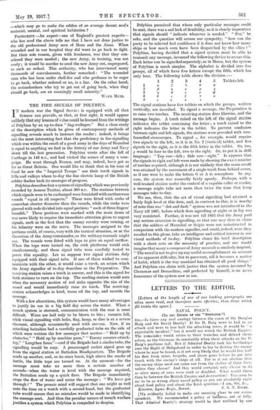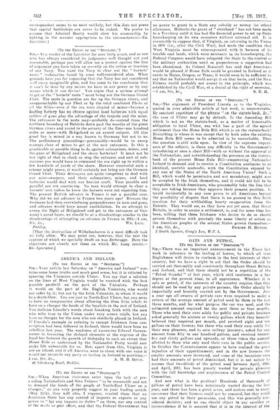LETTERS TO THE EDITOR.
[Letters of the length of -one of our leading paragraphs are often more read, and therefore more effective, than those which fill treble the space.]
NAVAL POLICY.
(To THE Duro& or Tas " Smarms.") Sni,—Is there any real analogy between the cases of Sir Douglas Haig and Sir David Beatty? If Sir D. Haig were to fail in an attack and were to lose half the attacking force, it would be " a regrettable incident," but it would not wreck the British Empire. The remainder would retire to their trenches and defend them- selves, as the Germans do constantly when their attacks on Sir D. Haig's positions fail. But if Admiral Beatty- took his battleships into the Bight of Heligoland in order to try to destroy the enemy where he may be found, is it not very likely that he would lose half his- fleet from mine, torpedo, and shore guns before he got into touch with the enemy's ships at all. For is it not obvious that the enemy ships need not come out from the shelter of their forts unless they choose? And they would certainly only choose to do so after many of ours were sunk or disabled. What would there then be between the British Empire and destruction? You seem to me to be as wrong. about naval policy as you are absolutely right about food policy and about the Irish question.—I am, Sir, dc., Kincora, Lyme Regis, Dorset. J. S. N. Roca& . [We evidently failed to make our meaning clear to our corre- spondent. We recommended a policy of boldness, not of folly. That Admiral Beatty's strategy would be that outlined by our correspondent seems to us most unlikely, but this does not prove that capital battleships are never to be risked. We prefer to assume that Admiral Beatty would show his seamanship by fighting in the manner appropriate to the circumstances.—ED. Spectator.]



























 Previous page
Previous page